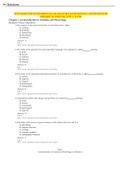Page 1 Fundamentals of Anatomy & Physiology, 8e (Martini) TEST BANK FOR FUNDAMENTALS OF ANATOMY & PHYSIOLOGY, 8TH EDITION BY FREDERIC H MARTINI, JUDI L. NATH Chapter 1 An Introduction to Anatomy and Physiology Multiple Choice Questions 1) The analysis of the internal structure of individual cells is called A) cytology. B) histology. C) embryology. D) physiology. E) anatomy. Answer: A Diff: 1 Skill: Level 1 Questions: Reviewing Facts and Terms 2) The study of the general form and superficial markings of an organism is called anatomy. A) gross B) surface C) systemic D) regional E) surgical Answer: B Diff: 1 Skill: Level 1 Questions: Reviewing Facts and Terms 3) The study of the superficial and internal features in a specific area of the body is called anatomy. A) surface B) regional C) surgical D) pathological E) radiographic Answer: B Diff: 1 Skill: Level 1 Questions: Reviewing Facts and Terms 4) Anatomical features that change during illness are studied in anatomy. A) gross B) surface C) microscopic D) pathological E) regional Answer: D Diff: 1 Skill: Level 1 Questions: Reviewing Facts and Terms 5) The study of the liver is to gross anatomy as the study of the liver cell is to A) physiology. B) regional anatomy. C) cytology. D) systemic anatomy. E) radiographic anatomy. Answer: C Diff: 1 Skill: Level 1 Questions: Reviewing Facts and Terms A+ Solutions Page 2 Fundamentals of Anatomy & Physiology, 8e (Martini) 6) The study of the first two months of development is termed A) histology. B) embryology. C) cytology. D) pathology. E) organology. Answer: B Diff: 1 Skill: Level 1 Questions: Reviewing Facts and Terms 7) The study of the function of specific organ systems is called A) systemic physiology. B) organ physiology. C) cell physiology. D) pathological physiology. E) histology. Answer: A Diff: 1 Skill: Level 1 Questions: Reviewing Facts and Terms 8) Cardiovascular physiology is an example of A) histophysiology. B) organ physiology. C) systemic physiology. D) pathological physiology. E) physiological chemistry. Answer: C Diff: 1 Skill: Level 1 Questions: Reviewing Facts and Terms 9) Which of the following is arranged in correct order from the most COMPLEX to the SIMPLEST? A) cellular, tissue, molecular, system, organ, organism B) molecular, cellular, tissue, organ, system, organism C) tissue, cellular, molecular, organ, system, organism D) organ, organism, molecular, cellular, tissue, system E) organism, system, organ, tissue, cellular, molecular Answer: E Diff: 1 Skill: Level 1 Questions: Reviewing Facts and Terms 10) Which organ system provides support, protection of soft tissue, mineral storage, and blood formation? A) integumentary B) muscular C) skeletal D) nervous E) endocrine Answer: C Diff: 1 Skill: Level 1 Questions: Reviewing Facts and Terms A+ Solutions Page 3 Fundamentals of Anatomy & Physiology, 8e (Martini) 11) Which organ system transports nutrients, metabolic wastes, gases, and defense cells? A) cardiovascular B) digestive C) muscular D) respiratory E) urinary Answer: A Diff: 2 Skill: Level 1 Questions: Reviewing Facts and Terms 12) Which organ system includes the spleen and the tonsils? A) digestive B) endocrine C) nervous D) cardiovascular E) lymphatic Answer: E Diff: 2 Skill: Level 1 Questions: Reviewing Facts and Terms 13) The kidneys and ureters are organs of the system. A) endocrine B) digestive C) respiratory D) urinary E) lymphatic Answer: D Diff: 1 Skill: Level 1 Questions: Reviewing Facts and Terms 14) The pituitary gland and thyroid gland are organs of the system. A) endocrine B) cardiovascular C) respiratory D) lymphatic E) digestive Answer: A Diff: 1 Skill: Level 1 Questions: Reviewing Facts and Terms 15) Which organ system removes carbon dioxide from the bloodstream? A) cardiovascular B) lymphatic C) respiratory D) digestive E) endocrine Answer: C Diff: 1 Skill: Level 1 Questions: Reviewing Facts and Terms A+ Solutions Page 4 Fundamentals of Anatomy & Physiology, 8e (Martini) 16) Lungs are to the respiratory system as the liver is to the system. A) lymphatic B) urinary C) digestive D) cardiovascular E) both B and D Answer: C Diff: 1 Skill: Level 1 Questions: Reviewing Facts and Terms 17) Skin, hair, and nails are associated with the system. A) skeletal B) muscular C) integumentary D) endocrine E) both A and B Answer: C Diff: 1 Skill: Level 1 Questions: Reviewing Facts and Terms 18) The maintenance of a constant internal environment in an organism is termed A) positive feedback. B) homeostasis. C) negative feedback. D) effector control. E) integration. Answer: B Diff: 1 Skill: Level 1 Questions: Reviewing Facts and Terms 19) When body temperature rises, a center in the brain initiates physiological changes to decrease the body temperature. This is an example of A) negative feedback. B) positive feedback. C) nonhomeostatic regulation. D) diagnostic regulation. E) fever. Answer: A Diff: 1 Skill: Level 1 Questions: Reviewing Facts and Terms 20) In general, the nervous system does each of the following, except A) helps to maintain homeostasis. B) responds rapidly to change. C) directs long-term responses to change. D) directs very specific responses. E) both B and D Answer: C Diff: 1 Skill: Level 1 Questions: Reviewing Facts and Terms A+ Solutions





